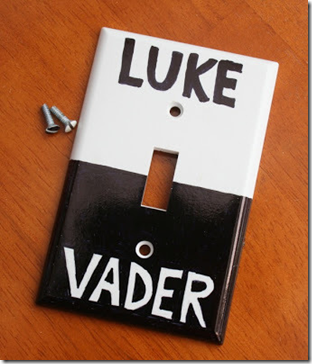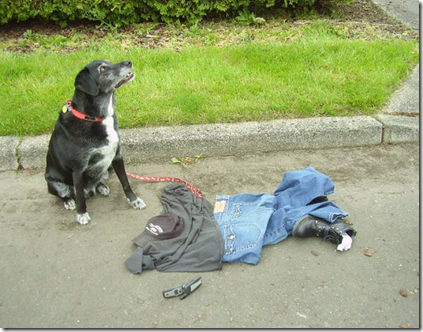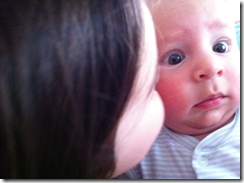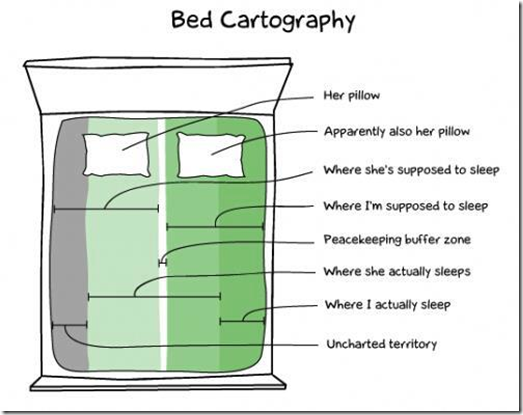Unscripted Star Wars genius
/On this week’s episode of Parks and Recreation, Patton Oswalt guest stars as a resident who invokes a bylaw about citizen filibustering to delay a city council vote. The show's producers gave Oswalt full creative power for the scene, asking him to simply "ramble a bit about whatever subject he wanted."
And he did — about Star Wars.
For a full eight minutes, Oswalt lays out a potential, detailed plot for the next installment of the film (he even threads in Disney elements, due to the recent acquisition of Lucasfilm).
It’s pure genius.
Bad news for cats and dogs and goldfish everywhere
/Eternal Earth Bound Pets, the company of atheists who sought to care for pets left behind on Earth following the Rapture, has gone out of business due to a lack of clients.
Apparently the true believers have no qualms about leaving their pets behind to starve when they join Jesus.
Either that or they have faith that when push comes to shove, God will reconsider his position on dogs and cats and include them in the Rapture.
I’m back.
/Sorry, dear reader, for my recent absence. Rest assured it was the result of a lack of ideas or two days of oversleep or even death.
I mention the death part because one reader inquired about my state of existence after missing two days of posts. She understandably pointed to my two near-death experiences as a reason why she thought I might be deceased, but if I were dead, what kind of response was she expecting?
Alas, a full database on my server prevented me from uploading any more content, and a less-than-competent customer service representative assured me that the problem was not on their end, sending me on a 24 hour goose chase.
It’s become apparent that I need to learn more about WordPress. Unable to do so this time, I did the next best thing:
I hired professionals to help.
Thanks to my friends on Twitter for recommending such outstanding an reputable professionals. The one silver lining born from these two days of frustrations that I think I’ve found myself a new website designer.
Hooray for small victories.
Call me an imbecile all you want. Just leave these particular fathers alone, lest we hurt their feelings and make them cry.
/Apparently there are fathers in the world who don’t like to be perceived as bumbling fools.
From a New York Times piece on the issue:
The hapless, bumbling father is a stock character in product marketing. He makes breakfast for dinner and is incapable of handling, or sometimes even noticing, a soggy diaper. He tries desperately to hide the crumb-strewn, dirt-streaked evidence of his poor parenting before the mother gets home.
This is an image that many fathers who attended the Dad 2.0 Summit — a meeting of so-called daddy bloggers and the marketers who want to reach them — have come to revile. They are proud to be involved in domestic life and do not want to serve as the comic foil to the super competent mother.
I suspect the real problem here is that the fathers attending the Dad 2.0 Summit are lacking self worth and humility. Basically, these men are being made to feel bad by commercials that portray them as bumbling fools.
First, we are all bumbling fools from time to time. Men and women alike. Embrace it. Revel in it. Self deprecation is a beautiful thing. Make the world a better place. Be the clown.
I was in the supermarket yesterday, looking for a “heavy mango” and a “ripe avocado.” Could I have handled this mission on my own?
Possibly.
But instead I asked two different women to help, explaining to each that I was likely to screw things up if left to my own devices.
My wife once sent me to the supermarket for a mango and I came home with a papaya. We didn’t even know it was a papaya until we took a photo of it and asked the readers of my blog to help us identify it.
There’s nothing wrong with being the bumbling fool from time to time. There’s even less wrong with pretending to be the bumbling fool if it means getting a little assistance when needed.
More importantly, if a commercial is capable of making you feel bad about yourself, the problem is not with the commercial but with you. Who cares how a laundry detergent commercial portrays a father in an effort to sell more soap? It doesn’t effect me. I know who I am, and more importantly, I know what kind of father I am. Happily, I am incapable of being threatened or harmed by a 30-second commercial, and I would like to suggest that the fathers at the Dad 2.0 Summit embrace the same mental framework (but only after changing the ridiculous name of their conference).
If these men were ten years old, their complaints would sound something like this:
“No fair! The Campbell’s Soup Company is making that mommy look super smart and making that daddy look silly and dumb! That hurts my feelings! Tell them to stop!”
As adults, they instead choose to gather for a conference at a hotel, assign their conference a “2.0” moniker in order to sound forward thinking and then self-importantly label the whole thing as a “summit,” which according to Webster’s Dictionary is “a conference of highest-level officials,” which this is definitely not.
Grow up, gentlemen. If you find the image of a super competent mother threatening, the problem is not with the advertiser but with you.
Politics of Competitive Board Gaming Among Friends
/You’re going to love this. I promise. It’s as if characters from any one of my novels were ripped from the pages and brought to life.
Father and son in Shakespeare
/The idea that reverting to the original pronunciation of Shakespeare’s day has brought new meaning to his work is fascinating, but the most interesting aspects of this video for me was the relationship between this father and son.
They have chosen to pursue an identical line of work and seem remarkably simpatico as a result.
As the son of an evil step-father and an absentee father, I can’t begin to understand a relationship like this, but I envy it more than you can imagine.
My wife was right. You were right. But I was a little right, too.
/Yesterday I wrote about my recent decision to invent a word while in a debate with another person in order to determine his intelligence. My assumption was that if he ignored the invented word and pretended that he understood its meaning, I could rightfully assume he was an idiot.
My wife, and about 85% of my readers, disagreed with me, oftentimes with vehemence.
Rather than responding individually via Facebook, Twitter, email and the comments on the post itself, I thought I’d write another post in response.
Here goes.
First, as for the comments about the typos on the post (and other posts), these were the only responses that annoyed me (perhaps because I received so many of them).
Yes, I proofread my blog. My wife proofreads my blog as well. But proofreading does not guarantee the elimination of typos, especially when one is writing everyday and posting on the same day.
To suggest that proofreading is not happening or that I am careless is just silly. Anyone who writes knows that our own typos are the most difficult to see. There is a reason that professional copyeditors and proofreaders exist. This is the reason. Proofreading is not an easy job. It requires a special skill set that I do not possess.
However, if you are ever annoyed by a typo on this blog, please know that I am at least as annoyed as you are. I despise typos with every fiber of my being. When I see a typo a day, a week or a month after publishing a post, it embarrasses me to think about how many people have already read the post and seen the error. Therefore I encourage you to inform me about typos by any means you so choose. I want to know about them and am never offended when a reader points them out. I am only eternally grateful.
Okay, onto the crux of the argument.
First, most of you agree with my wife in her assertion that inventing a word for the purposes of determining intelligence is mean-spirited. In rereading the post, I realize that my mistake was twofold.
First, I failed to acknowledge that I agree with my wife’s assertion. I agree that the purposeful use of an invented word to determine intelligence is mean-spirited.
Second, I failed to inform the reader that the person with whom I was debating was acting like a jerk and a blowhard. I was not engaged in a civil discussion about the merits of one educational policy over another. Instead, I was in a heated argument with someone who was at least as mean-spirited as me.
In this circumstance, I was not trying to be nice. I was in a heated debate with a person who was being equally impolite. While it might be inappropriate for me use this tactic on a friend or colleague (as much as I may be tempted), I was debating a person who I did not know well and who was engaged in verbal fisticuffs with me.
We were really going at it.
Yes, it was mean. I agree. I just don’t think I am required to be polite or forthright when engaged in this kind of argument with a person who I barely know.
You may disagree on this point. If so, I can respect that.
As for the effectiveness of the tactic, I think that many of the people who responded are correct in asserting that this is hardly an effective means of determining intelligence.
Readers responded:
I have found in my life their are many words I may not know but go by context of the sentence to come to a reasonable conclusion as to what a word may mean.
It's also possible that the person thought you were using a word you did not understand and wanted to save you the embarrassment of bringing it up. Maybe they were just being polite.
Your debate opponent didn't wish to embarrass you by confronting you about your made-up word and so you appear to them to be the dolt. I have actually been in this situation - hearing someone make up a word, create an unintentional malapropism, or simply mispronounce a common word (in one case the common word being "rice pilaf" in which they reversed the vowel sounds in "pilaf"). I had to choose whether or not to help them out of their blunder or maintain professional courtesy.
It's possible that the guy wasn't even listening in the first place. That happens to me all the time.
Maybe he thought you were the moron for using a made up word but had the social graces not to embarrass you.
These are all valid arguments, and I agree completely. To expect that this tactic would yield any measure of intelligence was stupid on my part.
There were also readers who thought that my tactic probably made me look like the fool.
Seems to be the person may not wanted to seem stupid by asking the definition. Pretty sure they are telling their friends that you are full of yourself or maybe other choice words!
I regularly have to talk to a guy (work thing) who "thinks" he is the smartest guy on earth. He makes up big words and uses others completely incorrectly. I NEVER get off the phone thinking he's brilliant and in fact usually hang up the phone thinking he's an idiot and how sad it is that he doesn't know it. I obviously agree with your wife here.
Honestly, I'd first think you were an idiot for making up words. In my line of work, people make up words all the time to seem smart. I would also probably go home and look it up just to make sure I'm not the idiot.
These arguments hold considerably less weight with me because the man’s opinion of me in this case was irrelevant. In fact, I often find it advantageous to have my verbal opponent misjudge my abilities. When I debated competitively in college, I would often open the debate with a statement meant to mislead. I might intentionally appear unprepared, ill informed or falsely imply that I would be assuming a position that was easily countered. Going into a debate against an opponent who underestimates you often puts you at an extreme advantage. His opinion that I am an idiot is irrelevant to me and possibly beneficial.
Several people compared my actions to that of a bully, and still others implied that this tactic was nothing more than an attempt to demonstrate my mental superiority over the man. For example:
How does that separate you from any school yard bully? Why is it so important to you to be mentally superior than another?
I agree with all. It seems you are using your intelligence to bully others in this sense.
I’m not quite sure how to feel about these comments and others like them. At its heart, isn’t a debate an attempt to exert your mental superiority over another person? Doesn’t the debater use his or her mental facilitates, expertise of the subject matter, cunning and wit to counter any attempt by his or her opponent to do the same?
Does an attempt to change a mind or at least convince a person that they don’t know what the hell they are talking about amount to verbal bullying?
I’m not sure. I’ll continue to ponder this question.
Lastly, there were at least three people who expressed concern that yesterday’s post and posts similar to it do not serve me well in terms of the sales of books. In short, presenting myself as an unlikable jerk does not make people want to support my writing career. This is an interesting point and one that I have considered quite often over the years.
The question is this:
Should I continue to be as honest as I am on my blog, or does my honesty sometimes do more harm than good?
In thinking about this issue, I was reminded of the number of people at a recent book retreat who expressed appreciation for my honesty. One person said, “You’re just not afraid to tell us how stupid you are.”
When people comment on my level of honesty, I think they are actually talking about my openness. My fellow authors at that retreat were undoubtedly just as honest as I was. They simply did not always opt for full disclosure. They chose not to offer details about their lives that might make them appear like idiots or malcontents.
I have a greater tendency to do exactly that.
One of my friends often says that I “live out loud.” He’s right. For whatever reason, I have always been more willing to share the less appealing aspects of my life and my personality.
Does this hurt book sales? I don’t know.
Perhaps for every person who appreciates my openness and honesty, there is a person who would like me to shut the hell up.
This is also a question I will continue to ponder, though I suspect that little will change in this regard. Like many of the characters in my books, I can only be myself, as unfortunate and ugly and detrimental as that might sometimes seem.
Hopefully you will continue reading about my journey and forgive the occasional outbursts of stupidity.
A correction, an explanation, an inexplicable bit of British advice and a forgotten ferret
/A few updates on recent posts:
Last week I wrote about Paul McCartney’s recent decision to absolve Yoko Ono of any responsibility for the Beatles breakup, referring to him as a “jerk face” for having waited so long.
It turns out that McCartney has asserted this in the past, despite stories in Slate, TIME, Rolling Stone and The Daily Beast which seemed to imply otherwise.
Apologies to Paul, though I don’t think he reads my blog.
__________________________________
Last week, as part of my unfair assumption series, I stated that men who own ferrets are immature and likely unemployable.
It turns out that one of my oldest friends owns a ferret. I had forgotten. Or maybe I never knew.
Either way, he has been gainfully employed for a very long time, but even he might accept the immature tag to a certain degree.
Nevertheless, I still stand by my unfair assumption as a general rule but not universal truth.
There are always exception, people. I get that.
__________________________________
In terms of my recent unfair assumption that people who back into parking spots are at best irrational and more likely insane, the reaction to that post (and there was a lot) was 90/10 in favor of me. Those who disagreed, however, were vehement in their protest.
First, let me state what I thought was obvious:
There are times when backing into a parking spot makes perfect sense. You’re attending a Springsteen concert and you’re parking your car in a garage. Knowing how difficult it will be to exit after the concert, you back your car into the parking spot in hopes of making your escape a little easier.
Of course this makes sense.
My unfair assumption (which is still unfair) was directed at those who always back into parking spots. My rationale is this:
Backing up a car is more difficult than driving forward.
If you can’t agree to this, I don’t want to argue with you. You’re already completely irrational.
Since all rationale people agree that backing up a car is more difficult than driving forward, it makes no sense to back your car into a limited, defined space and run the risk of hitting a car on either side or having to repeat the process because you ended up close to the line or another car.
When you back out of a parking space, you have the entire lane to back into, with as much room as needed. There is no danger of hitting a parked car or ending up too close to a parked car when backing out of space. The lane is wide open.
Some people claimed that backing into a space provides for a quicker exit. While I agree, I would argue that it also provides a considerably slower entry, and the time saved during the exit is miniscule compared to the time wasted backing in.
Be honest: How many times have you seen someone backing into a parking spot, only to have to pull out and begin backing up again because he or she misjudged their car’s position or did a poor job backing in the first time?
This happens all the time. And oftentimes we have to wait for the irrational driver to get it right before we can drive past him or her.
I once worked with a woman who required three or four tries before managing to back the car into a parking spot, and she did this every single day for the twelve years that I worked with her. She, too, claimed that backing in allowed for a quicker exit, but the time wasted backing in and out of the parking spot every day was astounding.
One of my UK readers wrote:
In the UK, driving schools you get taught to back into a parking spot whenever possible. In fact, my instructor used to say “Don’t be a nosy parker!” so that I’d remember!
I am still awaiting a reason for this insanity.
Unfair assumption #1: The larger a man’s watch, the smaller his personal sense of self worth.
/In an effort to be more aware of my own prejudices and biases, I have begun examining some of my potentially less-than-fair assumptions about people and life. I’ll be posting them here from time to time.
Please note that these are not necessarily unfair but potentially so. I’m only admitting to the possibility that I am wrong.
Here’s the first:
It’s probably unfair, but I can’t help but think that the larger a man’s watch, the smaller his personal sense of self worth.
Feel good
/Less than two minutes that may restore your faith in humanity:
Old people are hilarious.
/A couple who have been together for 72 years gives their grandson five keys to a successful relationship.
Hilarity ensues.
What’s in a name? Several literary references.
/It’s a boy! In case you haven’t heard, my wife gave birth to a beautiful baby boy yesterday named Charles Wallace Dicks.
Charlie was born at 3:09 PM. He is 7 pounds, 1 ounce and 18 inches long.
We chose Charlie’s name for a number of reasons.
To start, we liked the name Charles a lot. We liked the old feel of the name and the way it seems to match well with his big sister’s name (Clara). I’m also an enormous fan of Charles Dickens (I have three plants in my classroom named Pip, Philip and Pirrip), so the connection to this literary giant didn’t hurt.
We also love the nickname Charlie. My favorite moment during Charlie’s delivery happened just seconds after Charlie was born. With The Byrd’s Turn Turn Turn playing in the background, a nurse asked us what his name was, and Elysha called out, “Charlie!” When I heard her say his name aloud, in what I can only characterize as the most beautiful singsong voice I have ever heard, I knew we had chosen the right one.
It was one of those moments I will never forget.
As for the Wallace, a couple literary thoughts guided our decision.
First, Charles Wallace is the protagonist in Madeleine L’Engle’s WRINKLE IN TIME series, which are books that Elysha and I both adored as children. In fact, I had recently expressed hesitancy in re-reading the books as an adult, in fear that they won’t hold up to my fond memoires of them, but I guess I have no choice now.
Elysha and I are also fans of the poet Wallace Stevens, who lived and worked in Hartford, the city where Charlie was born. We especially love the poem 13 Ways of Looking at a Blackbird and have taught it to our students every year. Every year, I discover new depth hidden within the poem, and I hope I can say the same about my son someday.
Our perfect little boy, Charles “Charlie” Wallace Dicks!
A whole new breed of middle school student
/I admire this kid on so many levels:
- His product
- His company’s website
- His entrepreneurship
- The origin of his idea (spite)
- His choice of scents (bacon, baseball mitt, fresh cut grass, campfire)
- The way he has cleverly tied in charitable giving into his business model
And at the same time, I kind of hate the kid as well. Middle school students are not supposed to be this clever and industrious.
I was an idiot in middle school. I was spending my days playing videogames, fishing, shooting hoops and constantly staring at girls.
This kid has launched a company and is making a profit.
How To Survive a Robot Uprising
/Don’t laugh. This might just save your life someday. Seriously.
Prom update from a white boy
/Good news. Sort of. Yesterday I wrote about Amanda Dougherty, the 17-year old girl who was not allowed to attend her prom because she did not have a date.
It appears that she attended the prom after all, but only after finding a replacement date. Had no male escort been found, she still would have been barred from the event.
This makes me happy for the young lady, who had expressed a strong desire to attend her prom, but it does not mitigate the actions of the school administrators, who have chosen to keep this arcane, potentially humiliating policy in place.
I still hope that they find themselves alone on Christmas.
I was also surprised to discover is that my high school, and many other high schools at the time, had similar policies in place when I was attending my proms.
I had no idea.
I attended a total of seven proms and one sophomore semi-formal in my time.
I attended my sophomore semi-formal with my friend, Wendy, who recently referred to me as a hot celebrity. I am still not sure what made this event semi-formal.
I attended my junior and senior proms with my high school girlfriend, Laura.
Laura and I then attended the proms of two friends from neighboring towns, swapping dates in order to gain access.
I’m still not sure why we did this. We enjoyed our proms well enough, but squeezing two additional proms seems a little silly in retrospect.
A year out of high school, I attended the prom of my girlfriend, Lisa, who was a senior in high school at the time.
I also attended the prom of a tragically shy co-worker who misconstrued my agreement to attend her prom as a sign that I liked her in a romantic way (even though she knew my girlfriend at the time). We left the prom less than an hour after arriving once it became clear that she was extremely uncomfortable at the event. She didn’t appear to have a relationship with any of her classmates and was even more withdrawn among them than she was at work. I suggested that we find something better to do, and she smiled for the first time that night and agreed. Instead of dancing the night away, we went to Dairy Queen for cheeseburgers and ice cream and then to the movies, still dressed in our formal wear.
We saw Say Anything, which seemed especially fitting at the time.
It actually turned out to be a fun and memorable night. But a week later, when I was forced to explained to the girl that I only wanted to be friends, she sent me a series of disturbing letters, one implying that she was going to hurt herself if I did not reciprocate her feelings. I was forced to bring the matter to the attention of my boss and ultimately the girl’s parents, bringing an end to our friendship entirely.
Four years later, while managing the night shift McDonald’s, I took a girl named Francis to her prom when her mother forbade her from attending the prom unless she found an escort who her mother trusted implicitly. Being Francis’s boss and having survived an armed robbery together, I was her mother’s first choice, and naturally I agreed to escort her.
Other than the fact that I was referred to as “white boy” for most of the evening, we had a great time.
A song for all the crazy readers of the world
/I’ve been a fan of the Canadian band Moxy Fruvous for a long time, and as a result, I assumed everyone else was as well. But when I mentioned this song to an author at the Newburyport Literary Festival this weekend, she had never even heard of the band.
I fell in love with this song long before I published my first book, because like all authors, I was very much a reader first. And while this may seem like the ideal song for an author, it is really a song about the oftentimes unspoken obsession that readers have for books.
















